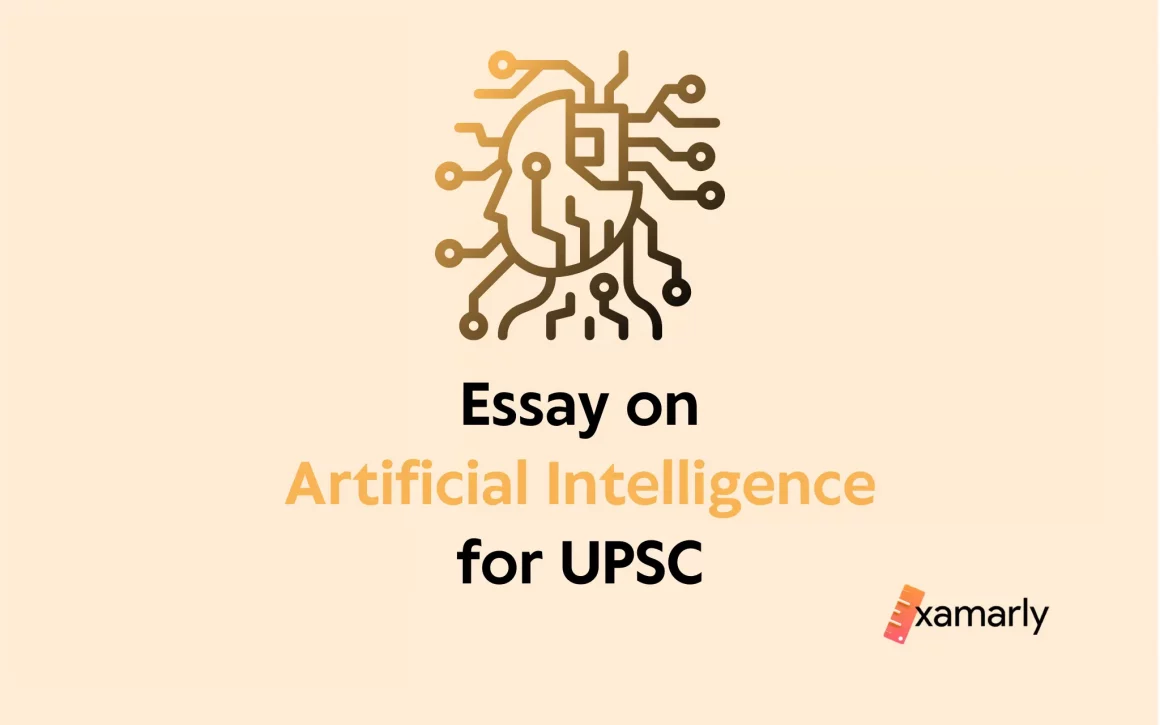Why is an essay on Artificial Intelligence UPSC relevant?
Artificial intelligence (AI) has become an increasingly important part of the modern world. Artificial Intelligence is what we can call the stimulation of human intelligence onto machines. In this boom of technological revolution, we are left to wonder if natural intelligence matters anymore.
Quite often AI is misunderstood and misrepresented as something powerful and dangerous. As aware citizens who see the possibility of technology development and innovation through AI, it is essential that we understand what AI really is and isn’t.
Here we will look at artificial intelligence, including how it can be used, the components that makeup AI, and its impact on our daily lives. This article will help you design and write an essay on artificial intelligence UPSC style. The first step to writing an Artificial Intelligence essay UPSC level is to define what AI is.
Read on to familiarize yourself with the term AI.
- Artificial Intelligence (AI): What Exactly Is It?
- AI vs Machine Learning
- What Characteristics Does AI Have?
- Artificial Intelligence Developments Around the World
- Why Artificial Intelligence Is Beneficial?
- Artificial Intelligence in India: Challenges
- Ways to Harness AI's Power
- Conclusion
- FAQs On Artificial Intelligence
Artificial Intelligence (AI): What Exactly Is It?
John McCarthy coined the term “artificial intelligence” in 1956 at the Dartmouth conference, Massachusetts Institute of Technology (MIT).
The most prevalent misconception about artificial intelligence (AI) is that it refers to robots that perform monotonous repetitive tasks and behave like humans.
However, this isn’t quite accurate. The ability of machines (computers) to accomplish cognitive functions usually related to the human brain is referred to as artificial intelligence (AI), like learning, planning, and problem-solving (in other words, many human intelligence processes)all without any explicit programming from humans or any kind of human interaction!
Now that we have defined and understood what AI is, let us explore what AI does, how it is of use today along with what the future holds in store. We can also show the difference between two technologies in the same domain in our Artificial Intelligence UPSC essay.
AI vs Machine Learning
Both AI and machine learning go hand in hand. However, their difference is significant. The scope of these two technologies is the fundamental difference between these two advancements of technology.
- Artificial Intelligence(AI) refers to computer systems that can do activities that would ordinarily need human intelligence.
- Machine learning refers to systems that are not explicitly intended for a certain activity but do include some amount of learning.
People frequently confuse which of these two technologies is superior when using them. While deep learning and machine learning are both powerful technologies, the former comprises neural networks that require human intervention to optimize results.
Human specialists determine the hierarchy of features and distinguishing qualities of data in traditional machine learning. To streamline the learning process, humans create labels for the data. Deep learning also relies on labeled data. This way, the system learns to differentiate objects based on their characteristics via a Machine Learning algorithm.
Now we know what AI is and isn’t. This basic knowledge will not suffice for a UPSC-level essay on Artificial Intelligence. To make the examiner understand more about our extent of knowledge in the subject matter, we can also list out features in our Artificial Intelligence UPSC essay.
Also Read: How To Write An Essay In UPSC Mains
What Characteristics Does AI Have?
Computer programs have a natural tendency to look for patterns and predict the outcome of future situations. As these patterns emerge, computer programs can be categorized as “intelligent.”
An AI-based system is also capable of learning, which means that it can adapt to new conditions. In addition, it will be capable to integrate changes in its algorithm, allowing it to take more actions based on its learning process.
Ultimately, these systems will become as intelligent as humans, enabling them to become digital assistants and further replace human workers in many industries.
The foundation of AI is built on the notion of human intelligence. AI aims to simulate human cognitive activity by mimicking human behavior. The ability of an artificial system to learn and perform tasks better than humans is a key component of AI.
For example, a robot can use fuzzy logic to solve unfamiliar tasks. Likewise, it can apply knowledge from one domain to another.
While researchers and developers are making great strides in developing AI, there are also plenty of skeptics in the field. The issue of replaceability and unchecked power is a fear that strikes most minds.
Nevertheless, the developments in the Artificial Intelligence field and the discussions it is launching are a must-know for all UPSC aspirants. Discussing current affairs in our Artificial Intelligence UPSC essay can make it stand out and highlight our level of awareness about the subject.
Artificial Intelligence Developments Around the World
The societal and economic advantages of implemented AI are well-acknowledged around the world.
In contrast to China and Japan, which have allowed existing ministries to adopt AI in their various sectoral areas, many nations have established specialized government offices, such as the Ministry of AI in the United Arab Emirates and the Office of AI and AI Council in the United Kingdom.
While the world is still in its infancy, global developments in AI will be an increasingly important factor for economic growth. China forecasts that artificial intelligence would contribute 26% of its GDP by 2030, while the U.K. estimates that AI will contribute 10%.
France and Japan recently released AI strategies, and the U.K. published an industrial strategy in November. As AI tools improve, we can expect to see these countries continue to push the boundaries of this field.
In addition, NITI Aayog has released National AI Strategy Discussion Paper to provide guidance on the research and development of new and developing technologies. On August 24, 2017, Task forces (i.e., a working group) on artificial intelligence were formed.
Artificial intelligence can add significant value to a wide number of industries around the world, and It is expected to be a significant source of competitive advantage for businesses. Along with the advantages, listing out the challenges can be a good way to steer the Artificial Intelligence UPSC essay forward.
Why Artificial Intelligence Is Beneficial?
Artificial Intelligence can increase the calculation power of conventional computers. AI processes are usually self-learning, so they can work continuously without any rest. This can greatly increase the competitive edge of a company.
Furthermore, AI can predict the future and anticipate what people will need in a variety of fields. This can help in planning infrastructure and decision-making.
In addition, AI can be programmed to identify threats to human life. It is not yet clear how AI will impact the future of our society, however, it has the capacity to transform the way we live.
Listed below are some of its advantages:
- AI is the only solution to avoid human errors. AI technology isn’t susceptible to human error or discrepancies from human interactions. AI is trained to avoid human errors, allowing it to detect and correct mistakes without human assistance. Unlike human doctors, AI-enabled intelligent machines don’t depend on the mood of their operators, allowing them to focus on solving a particular case instead of focusing on a complex problem. For example, Google’s DeepMind can diagnose severe eye diseases as accurately as world-class doctors. Additionally, it can recommend the best treatment in 94% of cases.
- Another advantage of AI is that it’s highly scalable. Instead of being limited by the human brain, AI can integrate itself with scalable intelligent systems, from cell phones to supercomputers. The scalable nature of AI also allows it to perform tasks of varying complexity. Further, AI can improve the decision-making process thereby increasing productivity. Therefore, companies can benefit from AI for convenience, reducing the time required for data analysis.
- In the Healthcare sector, it is used to provide accurate diagnosis way before the disease reaches its acute phase.
- The use of AI in the education domain is expected to improve access to quality education and improve crowd management. It makes rewarding marks and grading automated and time-efficient.
- AI applications are also advancing the way we live and work, making it easier to manage our cities. For example, artificial intelligence can help improve traffic flow and power balancing, making it easier to monitor power outages.
- AI is already being used in the retail sector, with applications including personalized suggestions, image-based product search, and customer demand anticipation. AI guarantees smart mobility as well as improved supply chain management and delivery processes. Aside from improving customer service, AI applications can also be beneficial for retailers to monitor and prevent potential problems. It can also detect broken products and defective objects, notifying the responsible person.
- Many industries are integrating AI into their products to improve their performance. In the advertising world, AI is used to track user statistics and to show advertisements relevant to their interests. The manufacturing sector utilizes AI in its intelligent robots to hasten the automation process and better quality control.
- Similarly, in the agricultural community, AI is used to help buyers choose products. AI can also be used to reduce crop losses by building modern machines to provide advisories for sowing or monitor weather and diseases to avoid future mishaps. This in turn will increase crop yield.
- The e-commerce industry is incorporating artificial intelligence to make purchases and communication easier and more efficient.
- Innovations in gaming are also possible through AI. Technological innovation in strategic games like chess where artificial intelligence can control the opponent’s computer and even play the game for them using neural networks is an example of this.
These futuristic innovations and systems are growing in popularity in the market, but only a few professionals are working on building them. For this reason, there is an increasing demand for AI professionals in the market. However, despite the great potential for AI, it is essential to find a job with this skill set to be successful.
We can finish our Artificial Intelligence UPSC essay by listing out the challenge and what we think can be the way forward. This will show the examiner your opinion on the subject and your problem-solving skills.
Artificial Intelligence in India: Challenges
Implementing AI tools in Indian educational institutions is a challenge, especially in India, where educational institutions often lack data. Most don’t have an ERP in place and thus can’t pull data in a uniform format. Without such data, AI tools cannot accurately predict student performance.
Additionally, the current lack of data sets makes it impossible to create a single repository to train AI models. Consequently, the implementation of AI is slow and difficult.
Regardless of its promise to propel national progress and wealth, AI in India faces several barriers. Listed below are some of the most significant hiccups, which should be solved before the technology is fully adopted and embraced in the country.
- There is a lack of communication and collaboration between many stakeholders which hinders a natural developmental progression.
- Concerns about data privacy and security, as well as a lack of formal regulation regarding data anonymization.
- Lack of awareness about AI. The vast majority of Indians have no idea what Artificial Intelligence (AI) is or how it operates, and the benefits it may provide for businesses, governments, and individuals. This is mainly because AI is only just beginning to enter mainstream consciousness in other countries too.
- Difficulty with adoption is a reality. Indian businesses generally lack the resources required to implement AI systems and complex machines. For example, many companies don’t have enough data scientists on their teams to analyze customer data and build algorithms that can predict future events based on historical data sets.
- Another setback is the lack of resources and resource costs. There is a shortage of trained professionals who are proficient in Artificial Intelligence techniques like machine learning and deep learning(a subset of machine learning). As a result, organizations are unable to hire people with relevant skill sets or develop in-house talent quickly enough to keep up with the competition.
- Computing infrastructure is scarce and generates huge costs, making it difficult to build, train, and deploy AI-based services. Despite its rapid growth, cloud infrastructure has limited capabilities.
These were some of the current issues with AI-based systems in India. Let’s look at what can be the best way forward.
Ways to Harness AI’s Power
| 1. | Initiating Core and Applied AI Research | Core and applicable advanced research lay the groundwork for the commercial production and use of any technological innovation, especially AI. A substantial portion of effort and time must be put into conducting a thorough study of India’s AI policy. |
| 2. | Preparing India for the AI Revolution | India looks to be reasonably well-positioned to capitalize on the disruption in the AI system and develop itself as a center for AI-related activity in the future, owing to its strong IT industry and enormous youth population potential. Given the paucity of skilled academics and researchers, this advantage might swiftly become a burden. As a result, the government must take quick action to expand access to such capabilities. This is a key part of AI development that should be prioritized at the national level. |
| 3. | Adoption Acceleration | AI adoption in India has so far been sluggish and constrained. According to estimates, just 22% of Indian enterprises employ artificial intelligence in any of their business activities. India would miss out on the potential to establish a prominent place on the global AI map unless the government intervenes to encourage AI adoption. While governments at all levels recognize the need to develop AI, they should take proactive actions to speed AI adoption in a range of activities. |
| 4. | Ethical concerns, privacy, security concerns, & artificial intelligence | The adoption of AI will be a watershed event in humanity’s technological history, with human decision-making relying on computers and algorithms for the first time. As a result, any strategy document supporting AI must be cognizant of the possible AI ecosystem aspects that may undermine ethical behavior, infringe on one’s privacy, and compromise security protocols. Any such approach must include appropriate efforts to reduce these risks. For example, National Cyber Security Policy launched in 2013, emphasizes sensitizing people, customers, and employees to cybersecurity concerns, as well as fundamental and best practices sensitization to the safety of cyber threats and the execution of security programs. Before large-scale applications, ethical norms must be established. |
Consider Examarly to prepare for UPSC holistically. You will find everything from personalized study strategy to curated study resources under one umbrella, here.
Conclusion
AI has many benefits in our everyday lives, but it is not without its downsides. Many observers are concerned that AI will create an unequal share of the benefits and risks of technological advancement. Some countries will benefit greatly from AI, while other countries will suffer as they do not have the same resources as developed nations.
The developing world is also concerned that AI will reduce the demand for labor and natural resources. This could negatively impact the welfare of workers, and ultimately lower equilibrium wages and welfare.
We expect that India’s “AI for All” agenda emphasizes ethical AI and results in large-scale AI solutions in order to make India a larger ecosystem for AI and a dependable country to which the rest of the world may outsource AI-related work. AI systems created in India will help the entire planet.
Many people believe that AI-based applications will take their sweet time to master the human language and control the human race. Yet, AI is developing at an incredibly fast rate, which is causing some people to worry and have nightmares of a robotic army. This powerful technology can easily grow out of control and become too powerful for human use.
The emergence of complete artificial intelligence, according to Stephen Hawkins, may mean the extinction of the human race.
While this technology will undoubtedly benefit humans, it could also endanger society by increasing the wealth gap. Further, AI could be used for nefarious purposes, including autonomous weapons and malicious AI systems. Thus, the use of AI is only a step in a path that is yet to be disclosed.
Taking an ethical yet progressive approach to this social transformation is commendable while writing the essay on Artificial Intelligence in your UPSC exam. Prepare for UPSC with Examarly and to maximize your chances of acing the prelims. Check out Examarly for the best Civil Service study materials.
FAQs On Artificial Intelligence
What is the 4.0 Industrial Revolution?
How advanced people live and work is changing as a result of revolutionary trends and technology like robotics, the Internet-Of-things (IoT), virtual reality (VR), and artificial intelligence. The fourth industrial revolution is referred to as this. The incorporation of these technologies into industrial procedures is termed “Industry 4.0.”
Is AI the beginning of the Industrial Revolution 4.0?
A number of scientific and technological sectors have seen substantial advancements thanks to artificial intelligence (AI), also referred to as the 4.0 Industrial Revolution.
State 2 Examples Of AI.
1. By processing human language rather than computer language, computer software is said to be performing natural language processing (NLP). Consider spam detection, which determines whether an email is rubbish by examining the subject line and the email’s body.
2. Making a system or a group of processes run without human involvement is known as robotic process automation. Robots can be taught to carry out repetitive, elevated operations that would often be carried out manually, and they differ from IT standardization in that they can change course quickly in response to changing conditions.
What is the future of artificial intelligence?
The future of AI is uncertain, but it is likely that it will continue to play an increasingly important role in many aspects of our lives. It may also lead to the development of new technologies and industries, as well as new ethical and societal challenges.
What are the potential risks and concerns with artificial intelligence?
One of the main concerns with AI is the potential for it to automate jobs and increase unemployment. Additionally, there are concerns about privacy and the ethical implications of AI, such as bias and discrimination in decision-making.






